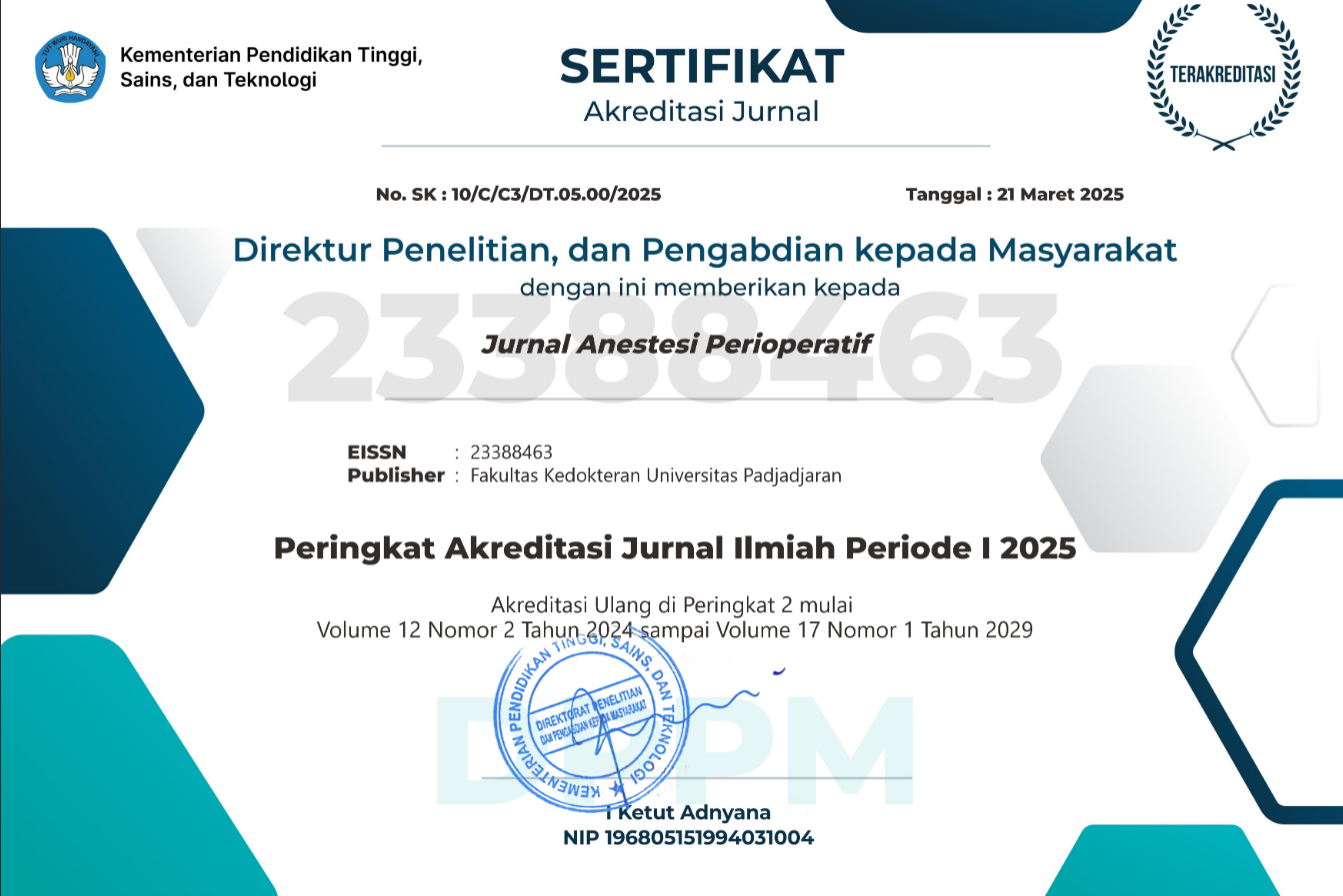Gambaran Prokalsitonin, Skor SOFA, dan Rasionalitas Pemberian Antibiotik pada Pasien Luka Bakar Berat di RSUP Dr. Hasan Sadikin Bandung Periode Februari–Agustus 2021
Abstract
Overview of Procalcitonin, SOFA Score, and Rationality of Antibiotics Administration to Patients with Severe Burns at Dr. Hasan Sadikin General Hospital Bandung, February–August 2021
Sepsis is currently the leading cause of death in severe burns due to its wide-ranging effects on organ systems. Procalcitonin and sequential organ failure assessment (SOFA) scores can determine the prognosis of septic patients in terms of mortality indicators, early therapy, and evaluation of the therapy given to reduce mortality and morbidity. Correct and accurate use of antibiotics is also essential in improving the patient's prognosis. This study aimed to determine the procalcitonin, SOFA scores, and the rationality of antibiotics administration to patients with severe burns at Dr. Hasan Sadikin General Hospital Bandung. This analytic observational study was conducted on 38 patients hospitalized in the Burn Unit and ICU of Dr. Hasan Sadikin General Hospital Bandung during February–August in 2021. Procalcitonin values supported by SOFA scores may refer to successful antibiotic administration and ceasing therapy in severe burn injury patients. Antibiotic administration to all patients with severe burns in Dr. Hasan Sadikin General Hospital was irrational as it was not based on cultural examination and procalcitonin on the first day of exposure. Clear signs of infection seen from the procalcitonin value, SOFA score, and culture to avoid antibiotic resistance must support rational prophylactic antibiotic administration.
Keywords
Full Text:
PDFReferences
Ramos G. Antibiotic prophylaxis in burn patients: a review of current trends and recommendations for treatment. J Infect. 2018;1(1):1–5.
Bowo, Setiagung Ambari,Putri AC. Pattern in burn unit of Hasan Sadikin Hospital (RSHS). J Plastik Rekonstruksi 2016;2:32–9
Soedjana H, Nadia J, Sundoro A, Hasibuan L, Rubianti IW, Putri AC, dkk. The profile of severe burn injury patients with sepsis in hasan sadikin bandung general hospital. Ann Burns Fire Disasters. 2020;33(4):312–6.
Chipp E, Milner CS, Blackburn AV. Sepsis in burns: a review of current practice and future therapies. Ann Plast Surg. 2010 Aug;65(2):228–36.
Nunez Lopez O, Cambiaso-Daniel J, Branski LK, Norbury WB, Herndon DN. Predicting and managing sepsis in burn patients: current perspectives. Ther Clin Risk Manag. 2017;13:1107–17.
Schuetz P, Albrich W, Mueller B. Procalcitonin for diagnosis of infection and guide to antibiotic decisions: past, present and future. BMC Med. 2011;9:107.
Kim HS, Yang HT, Hur J, Chun W, Ju YS, Shin SH, dkk. Procalcitonin levels within 48 hours after burn injury as a prognostic factor. Ann Clin Lab Sci. 2012;42(1):5–64.
Yu H, Nie L, Liu A, Wu K, Hsein YC, Yen DW, dkk. Combining procalcitonin with the qSOFA and sepsis mortality prediction. Medicine (Baltimore). 2019;98(23):e15981.
Singer M, Deutschman CS, Seymour C, Shankar-Hari M, Annane D, Bauer M, dkk. The Third International Consensus Definitions for Sepsis and Septic Shock (Sepsis-3). JAMA. 2016;315(8):801–10 .
Novita C, Maat S, Tambunan BA. Corellation of procalcitonin level with sepsis degrees based on sofa score. Indones J Clin Pathol Med Lab. 2019;25(3):312–7.
Gyssens IC. Quality measures of antimicrobial drug use. Int J Antimicrob Agents. 2001;17(1):9–19.
Dupuy AM, Philippart F, Péan Y, Lasocki S, Charles PE, Chalumeau M, dkk. Role of biomarkers in the management of antibiotic therapy: an expert panel review: I - currently available biomarkers for clinical use in acute infections. Ann Intensive Care. 2013;3(1):1–8.
Riedel S. Procalcitonin and the role of biomarkers in the diagnosis and management of sepsis. Diagn Microbiol Infect Dis. 2012;73(3):221–7.
Mokline A, Garsallah L, Rahmani I, Jerbi K, Oueslati H, Tlaili S, dkk. Procalcitonin: a diagnostic and prognostic biomarker of sepsis in burned patients. Ann Burns Fire Disasters. 2015;28(2):116–20.
Wirz Y, Meier MA, Bouadma L, Luyt CE, Wolff M, Chastre J, dkk. Effect of procalcitonin-guided antibiotic treatment on clinical outcomes in intensive care unit patients with infection and sepsis patients: a patient-level meta-analysis of randomized trials. Crit Care. 2018;22(1):191.
Bhatia MS, Attri R, Kant KR, Sharda SC. Correlation of quick SOFA score and procalcitonin with mortality in the emergency department. J Adv Med Med Res. 2020;32(6):64–9.
Lavrentieva A, Kontou P, Soulountsi V, Kioumis J, Chrysou O, Bitzani M. Implementation of a procalcitonin-guided algorithm for antibiotic therapy in the burn intensive care unit. Ann Burns Fire Disasters. 2015;28(3):163–70.
Fish DN. Meropenem in the treatment of complicated skin and soft tissue infections. Ther Clin Risk Manag. 2006;2(4):401–15.
Tagami T, Matsui H, Fushimi K, Yasunaga H. Prophylactic antibiotics may improve outcome in patients with severe burns requiring mechanical ventilation: Propensity Score Analysis of a Japanese Nationwide Database. Clin Infect Dis. 2016;
Schuetz P, Raad I, Amin DN. Using procalcitonin-guided algorithms to improve antimicrobial therapy in ICU patients with respiratory infections and sepsis. Curr Opin Crit Care. 2013;19(5):453–60.
DOI: https://doi.org/10.15851/jap.v9n3.2579
Article Metrics
Abstract view : 1303 timesPDF - 512 times
This Journal indexed by

JAP is licensed under a Creative Commons Attribution-NonCommercial 4.0 International License
View My Stats



